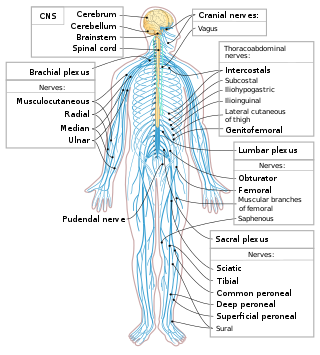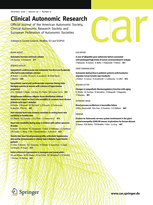Related Research Articles
Psychophysiology is the branch of psychology that is concerned with the physiological bases of psychological processes. While psychophysiology was a general broad field of research in the 1960s and 1970s, it has now become quite specialized, based on methods, topic of studies and scientific traditions. Methods vary as combinations of electrophysiological methods, neuroimaging, and neurochemistry. Topics have branched into subspecializations such as social, sport, cognitive, cardiovascular, clinical and other branches of psychophysiology.

The peripheral nervous system (PNS) is one of two components that make up the nervous system of bilateral animals, with the other part being the central nervous system (CNS). The PNS consists of nerves and ganglia, which lie outside the brain and the spinal cord. The main function of the PNS is to connect the CNS to the limbs and organs, essentially serving as a relay between the brain and spinal cord and the rest of the body. Unlike the CNS, the PNS is not protected by the vertebral column and skull, or by the blood–brain barrier, which leaves it exposed to toxins.

The autonomic nervous system (ANS), formerly referred to as the vegetative nervous system, is a division of the nervous system that supplies internal organs, smooth muscle and glands. The autonomic nervous system is a control system that acts largely unconsciously and regulates bodily functions, such as the heart rate, its force of contraction, digestion, respiratory rate, pupillary response, urination, and sexual arousal. This system is the primary mechanism in control of the fight-or-flight response.

The parasympathetic nervous system (PSNS) is one of the three divisions of the autonomic nervous system, the others being the sympathetic nervous system and the enteric nervous system. The enteric nervous system is sometimes considered part of the autonomic nervous system, and sometimes considered an independent system.

The enteric nervous system (ENS) or intrinsic nervous system is one of the main divisions of the autonomic nervous system (ANS) and consists of a mesh-like system of neurons that governs the function of the gastrointestinal tract. It is capable of acting independently of the sympathetic and parasympathetic nervous systems, although it may be influenced by them. The ENS is nicknamed the "second brain". It is derived from neural crest cells.
The following outline is provided as an overview of and topical guide to neuroscience:

Dysautonomia or autonomic dysfunction is a condition in which the autonomic nervous system (ANS) does not work properly. This may affect the functioning of the heart, bladder, intestines, sweat glands, pupils, and blood vessels. Dysautonomia has many causes, not all of which may be classified as neuropathic. A number of conditions can feature dysautonomia, such as Parkinson's disease, multiple system atrophy, dementia with Lewy bodies, Ehlers-Danlos syndromes, autoimmune autonomic ganglionopathy and autonomic neuropathy, HIV/AIDS, autonomic failure, and postural orthostatic tachycardia syndrome.
Neuroradiology is a subspecialty of radiology focusing on the diagnosis and characterization of abnormalities of the central and peripheral nervous system, spine, and head and neck using neuroimaging techniques. Medical issues utilizing neuroradiology include arteriovenous malformations, tumors, aneurysms, and strokes.

Neuropathology is the study of disease of nervous system tissue, usually in the form of either small surgical biopsies or whole-body autopsies. Neuropathologists usually work in a department of anatomic pathology, but work closely with the clinical disciplines of neurology, and neurosurgery, which often depend on neuropathology for a diagnosis. Neuropathology also relates to forensic pathology because brain disease or brain injury can be related to cause of death. Neuropathology should not be confused with neuropathy, which refers to disorders of the nerves themselves rather than the tissues. In neuropathology, the branches of the specializations of nervous system as well as the tissues come together into one field of study.

Hexamethonium is a non-depolarising ganglionic blocker, a neuronal nicotinic (nAChR) receptor antagonist that acts in autonomic ganglia by binding mostly in or on the nAChR receptor, and not the acetylcholine binding site itself. It does not have any effect on the muscarinic acetylcholine receptors (mAChR) located on target organs of the parasympathetic nervous system, nor on the nicotinic receptors at the skeletal neuromuscular junction, but acts as antagonist at the nicotinic acetylcholine receptors located in sympathetic and parasympathetic ganglia (nAChR).
Terminologia Anatomica is the international standard for human anatomical terminology. It is developed by the Federative International Programme on Anatomical Terminology, a program of the International Federation of Associations of Anatomists (IFAA).

Stephen W. Porges is an American psychologist and neuroscientist. He is the Professor of Psychiatry at the University of North Carolina at Chapel Hill. Porges is also currently Director of the Kinsey Institute Traumatic Stress Research Consortium at Indiana University Bloomington, which studies trauma. He was previously a professor at the University of Illinois, Chicago, where he was director of the Brain-Body Center at the College of Medicine, and at the University of Maryland.
Julia L. Newton is Clinical Professor of Ageing and Medicine and Dean for Clinical Medicine at the School of Clinical Medical Sciences of Newcastle University in Newcastle upon Tyne, England. She is Director of MD Studies in the Faculty of Medical Sciences at Newcastle, and a member of the Pharmacogenomics & Complex Disease Genetics Research Group

The International Society for Autonomic Neuroscience is a scientific society of researchers studying the autonomic nervous system. The society organizes scientific meetings, publishes a scientific journal, and supports students through awards and travel grants. It is a non-profit and non-governmental organization.
Autonomic Neuroscience: Basic and Clinical is a peer-reviewed scientific journal covering research on the autonomic nervous system. It is published by Elsevier and is the official journal of the International Society for Autonomic Neuroscience. It was established by Chandler McCluskey Brooks in 1978 as the Journal of the Autonomic Nervous System and obtained its current title in 2000. From 1985, and for many years thereafter, the editor-in-chief was Geoffrey Burnstock, who was succeeded by Roy Freeman.
Elspeth McLachlan, an Australian neuroscientist, is a world authority on neural pathways within the autonomic nervous system. Her work has included detailed analyses of transmission in autonomic ganglia to studies of the organisation of autonomic nervous pathways and their disorder in pathological states, particularly injuries to peripheral nerves and the spinal cord.
Sudhir V. Shah is an Indian neurologist, professor and the head of the department of neurology at Smt. NHL Municipal Medical College, Ahmedabad. Holder of an MD in general medicine and a DM in neurology, he is associated with the Neurological Society of India, Indian Academy of Neurology and Association of Physicians of India as a member. He is known for his research on brain cells and books on neurology and Jainism which have reportedly been sold over 50,000 copies, the earnings of which have been donated to charities. He is a former chairman of the National Jain Doctor’s Federation as well as a director of neurosciences at Sterling Hospitals and has served as the honorary neurologist to the Governor of Gujarat. He has written several articles on neurology and spirituality which include Journey to Happiness and Peace, The Art and Science of Meditation, Diseases of The Brain and Nervous System, and Jainism: A Super Science and is a co-author of Meditation Must, a book detailing the medical aspects of meditation. The Government of India awarded him the fourth highest civilian honour of the Padma Shri, in 2016, for his contributions to medical science.
Om Datt Gulati (1927–2012) was an Indian pharmacologist and the Dean of the Department of pharmacology at Baroda Medical College. Known for his researches in autonomic pharmacology, he was also a professor at Pramukhswami Medical College, Anand and an honorary fellow of the Indian Pharmaceutical Society. The Council of Scientific and Industrial Research, the apex agency of the Government of India for scientific research, awarded him the Shanti Swarup Bhatnagar Prize for Science and Technology, one of the highest Indian science awards for his contributions to Medical Sciences in 1971. He received B. C. Roy Award, the highest Indian medical award, in 1981.
Anirban Basu is an Indian neurobiologist, who is primarily interested in neurovirology, a senior scientist at the National Brain Research Centre, a deemed to be university, located in Manesar, Gurgaon, Haryana. He is internationally known for his studies on Japanese encephalitis. Basu is an elected fellow of all the three major Indian science Academies namely the Indian Academy of Sciences, the Indian National Science Academy and the National Academy of Sciences, India as well as of the West Bengal Academy of Science and Technology. The Department of Biotechnology of the Government of India awarded him the National Bioscience Award for Career Development, one of the prominent Indian science awards, for his contributions to biosciences and biotechnology, in 2010.

Clinical Autonomic Research is a bimonthly peer-reviewed medical journal covering research on the autonomic nervous system and its disorders. It was established in 1991 and is published by Springer Science+Business Media. The editors-in-chief are Horacio Kaufmann and Jens Jordan. It is the official journal of the American Autonomic Society and the European Federation of Autonomic Societies.
References
- ↑ Japanese Association of Medical Sciences. "Member Societies".
- ↑ Japanese Association of Medical Sciences. "Journal List Detail" . Retrieved 4 June 2014.